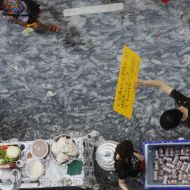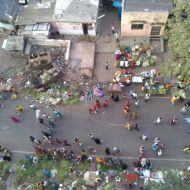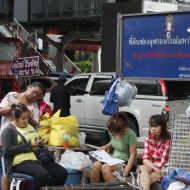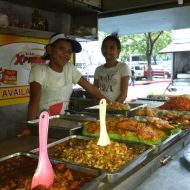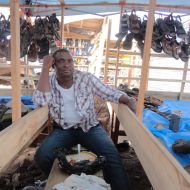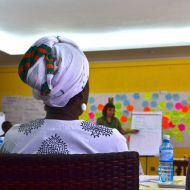Tensions Flare Between Traders and Officials After an Informal Market Burns
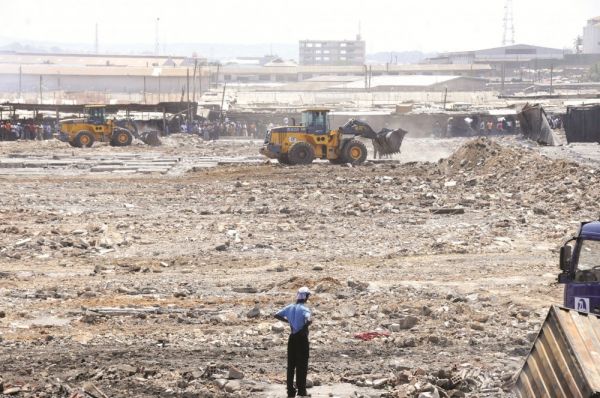
The fire left scores of traders with huge debts and no source of income. Photo credit: Ghana Daily Graphic
“You’re standing on my shop,” a young man says with an almost mischievous half-grin. I’m leaning against a blackened cement-block wall, looking out over the rubble-strewn wasteland that, until three days ago, was Kantamanto Market. He introduces himself as Eric Kwesi Danquah, and points to about three square feet of bare ground against the wall: This was his shop. “I sold khakis and Dickies.” He pauses. “You know Dickies, right?”
As Eric tells it, around seven o’clock on Sunday morning, May 5th, he came home from a morning jog to see more than forty missed calls on his phone. The official reports say the fire – or fires – that destroyed Kantamanto Market started around 5 a.m. that day. Like everyone else who received that phone call from a friend or sister or colleague, he rushed to the scene. He shows me photos: A pile of rocks and the same blackened wall I’m leaning on.
Eric is now 33 years old and has been selling in the market for 15 years. Like many young people, he undertook vocational training in his teens. His specialty was electrical work, but he wasn’t able to find enough gigs to get by. So he borrowed some money from a friend to lease a small space in Kantamanto and start a business. Now, that business is gone.
Initially suspicious, once the traders see Eric and I talking, they slowly begin to crowd around me to tell their stories. They tell me their shop numbers, the value of the goods they lost, the debt they are left with, how many children they are supporting. Comfort Kusi, 48, shop 027. She sold dresses and blouses and has two children. Mary Darkoa, 42, shop 064, sold t-shirts for “ten good years” at the market. She recalls the morning of the fire: “I came to meet the fire; it was raging seriously. I really wept. I was crying.”
Many of the traders had tried to get insurance, they tell me, but because most of the structures were wooden shacks, they were considered too high a risk. Most buy their goods with loans from banks or, more commonly, on credit from the importers who bring them into Ghana. So now, after the fire, hundreds of traders have been left with huge debts and no source of income.
Footage of the fire as captured by a local radio station. Credit: Citifmvideos via YouTube
“The city has been very quiet since it happened,” my trader friend Sammy tells me as we pick our way through the field of debris. “Everyone comes to buy and sell here.” Kantamanto is bigger than I’d realized, and filled now with clumps of people dressed in red and black – the traditional colors of mourning in Ghana – between the small mountains of rubble being flattened by bulldozers sent in by the city.
Before the fire, I knew Kantamanto Market simply as Accra’s mecca for secondhand-clothes shoppers. Secondhand goods from Europe and the U.S. are shipped in containers to the nearby port city of Tema and sold by the bale, typically on credit, to the dealers in Kantamanto. Buyers arrive well before dawn on Wednesdays and Saturdays – the days when new shipments typically arrive – to dig through mountains of blouses, trousers, dresses and jeans being sold for one or two cedis each. Some take their finds no more than a few feet beyond Kantamanto to sell outside for a few cedis more; others go back to their boutiques or elsewhere in the city. When I used to visit Kantamanto, I would find the market by asking around and wandering through the bewildering streets until I finally stumbled on the entrance. Two narrow parallel pathways led past rows of young men selling belts and then endless lines of shoes. One afternoon I bent down and saw stacks of brand new, plain black TOMS shoes, the brand’s “buy one, give one” model apparently having developed a few complications. After following the rows of shoes into the back, the used-clothing section stretched out in a labyrinth, piles of clothes, hanging clothes, some new, some used.
Kantamanto is a subsection of Makola Market, one of the largest open-air markets in West Africa. Different segments have different names and feels, but all are crowded and layered. There are the shops inside the buildings, clothes dangling from railings of second-story boutiques. To reach them, you have to pick your way past the stalls or piles of clothes and wares on the sidewalks, go up narrow staircases and squeeze through a footpath with piles of jeans being sold by young men. There is the Chinese market, where imports from China are sold in bulk. The household appliances, fresh vegetables, meat, cloth and every other imaginable kind of product has its own section, its own traders, its own networks, its own history, its own culture. Coconut carts and waakye stands sustain the traders and shoppers; young women selling purewater packets maneuver through the crowd. You have to duck and weave around them and others carrying everything from lumber to mops to appliances on their heads. Kantamanto was just one part of this ecosystem, a major center of trade.
But this version of the city, it seems, is not what the current mayor, Alfred Vanderpuiye, has in mind for central Accra. In statements to the press two days after the Kantamanto disaster, he announced that the market would be rebuilt, but “modernized to befit Accra as a Millennium City.” This has made the traders very nervous; they fear that they will be pushed or priced out of the new complex. They are demanding that the land be returned to them. They would rather, they tell me, spend the money to rebuild themselves than risk losing the space that they’ve occupied for more than 25 years in the prime trading location in Accra.
The bulldozing, the statement by the mayor, rumors of a helicopter hovering over the market the night before the fire – all are feeding the conspiracy theories. When the first traders to arrive tried to go in to recover what they could, they were held back. The next day, as they attempted to clear the rubble from the shops, they tell me, the police ejected them in the first of a series of altercations between traders and officials. “We were sacked from here,” a young man says. “They brought tear gas.”
Traders have expressed fears that the government will use the fire as an excuse to push them out. Credit: Afia Agyapomaa Ofosu via YouTube
Central Accra does seem to be the peripatetic site of a battle for the city, and this fire an instance of disaster capitalism of at least a mild form. Just a block or two north of Makola is the walled-off site where a new mall is under construction; just beyond that is the stunningly expensive Movenpick Ambassadorial Hotel, across from the National Theatre. A number of large companies have their headquarters just up the street, across from the government ministries. It is this vision – a sleek, prosperous-looking city – that seems to drive the mayor’s vision for Accra.
And it is this vision that the traders fear will push them out now that an opportunity to do so has arisen. That is why they are holding vigil in the market. Their livelihoods are at stake. As various politicians make promises and statements, they have been to visit the president. A large group of the women – who historically dominate petty trading in Ghana – went to appeal to Nana Oye Lithur, the Minister for Gender, Race and Justice. Their request, and they keep repeating it and repeating it, is very simple: Give us back the land. Let us rebuild. We don’t want the government’s involvement; we’ll never get back in.
They believe they have a legal right to it. They acquired the land where the market sat — slated decades ago for an expansion of the railway station that never happened — in 2007 in a 50-year rental agreement. They organized and paid about 1,000 Ghana cedis each to secure the lease. This is the basis of their argument for why they should be given back the land. Now, though, a little more than a week after the initial disaster, questions about the legality of the lease have arisen, and the Ga traditional council have gotten involved. My inner cynic says this is where politics and money will take over, overwhelming the claims and investments of the thousands who have built their lives here.
Just under the chaotic surface of this fight is the city’s broader struggle. It’s a struggle to bring formalization, recognition and organization to informal trade. “Informality” is not always what it seems; it comes in gradations. At Kantamanto, people buy and sell with informal credit systems, receipts are rare, many people stake a claim to a bit of sidewalk or a wall to sell on. One young man, Isaac, explains to me that he goes inside Kantamanto, buys belts and bags, and brings them just out to the wall bordering the place, where he sells them for a bit of a mark-up. With no overhead costs, he makes enough money to survive.
In Kantamanto, there are three trade associations that represent the traders and make the rules of the market – formalization in this case comes from sellers themselves. Some of the formalization also comes, in a less welcome form, from the city. The Accra Municipal Assembly periodically sends out officials to collect taxes from everyone trading on the streets. By collecting taxes, one could argue that the AMA is legitimizing the very businesses they claim to want to be rid of.
I found it saddening not only to speak with the traders about their losses, but also to see how little they expected from the city. No one was hoping for government loans to help them rebuild. No one believed they would receive any type of aid to get them through the difficult weeks and months ahead. This could have been a point during which, if more trust existed between the city and its citizens, a conversation could take place about how the traders might benefit from a modernized market, how they might be included in its planning. The fact that the traders I spoke with were so skeptical shows that even with the best intentions, a lot of mending will need to be done to create an inclusive future for Kantamanto and for informal trade in Accra.

